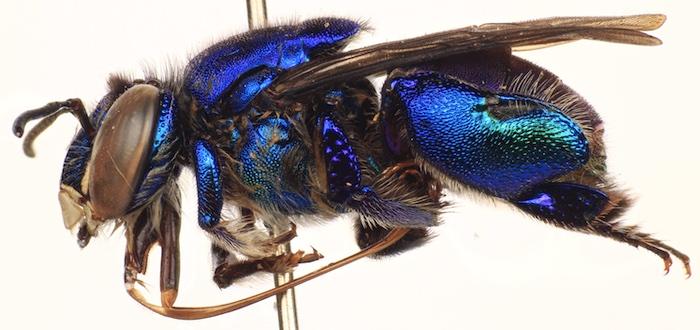LAWRENCE — A survey of orchid bees in the Brazilian Amazon state of Rondônia, carried out in the 1990s, is shedding new light the impact of deforestation on the scent-collecting pollinators, which some view as bellwethers of biodiversity in the neotropics.

Credit: K. Christopher Brown
LAWRENCE — A survey of orchid bees in the Brazilian Amazon state of Rondônia, carried out in the 1990s, is shedding new light the impact of deforestation on the scent-collecting pollinators, which some view as bellwethers of biodiversity in the neotropics.
The findings, from a researcher at the University of Kansas, are published today in the peer-reviewed journal Biological Conservation.
“This study on orchid bees was an add-on to previous research on stingless bees. Orchid bees are so easy to collect, so we added them to our broader survey of bee biodiversity across this rapidly developing region in the Amazon,” said lead author J. Christopher Brown, professor of geography & atmospheric science at KU. “We’ve known for decades that particular fragrances like eucalyptus oil, for example, attract male orchid bees, which naturally collect similar fragrances from orchids to use in mating. All you do is dip cotton balls into a variety of chemical attractants and hang these on a string in the open air. The bees start arriving in minutes, hovering around the baits and displaying their often metallic-hued blue and green colors.”
A specimen from the genus Euglossa collected during the study in Rondônia, Brazil.
Brown said that this ease of collection, in part, has made orchid bees, native to the tropical rainforests of the Americas, a regular subject of studies to determine the impact of deforestation and forest fragmentation on biodiversity. In a region of intense deforestation, the bees, because they are pollinators, help reveal the toll on local ecosystems more broadly.
“They were among the first types of organisms studied to understand the impact of that deforestation on the general biology and ecology of an area,” he said. The researchers identified species of orchid bee, Eulaema nigrita and 11 other species, that are particularly associated with degraded vs. preserved environments, respectively.”
Of the experience in the field with orchid bees, Brown said, “I had previously seen orchid bees in museum collections, but seeing them in the field was a wholly different experience. It’s breathtaking seeing these bees appear at the baits out of nowhere.”
Brown conducted all the fieldwork in 1996 based on a methodology developed with Marcio Oliveira, currently of the National Institute for Amazonian Research in Manaus, who was a fellow graduate student at the time.
“He suggested that, given our opportunity to collect stingless bees in Rondônia, we should also include orchid bees in our research,” Brown said. “To achieve this, we developed the methodology with the assistance of two young beekeepers from the region who temporarily abandoned their farming activities to join us in collecting bees throughout the state of Rondônia. Due to various commitments, publication was delayed. Fortunately, the scientific community appreciates the sharing of long-past data and observations.”
While the data concerns bees that lived decades ago, their scientific value remains high. In part, this is because the survey covered a much broader geographic area — the entire state of Rondônia — than previous studies of orchid bees. The researchers said their aim was to discover impacts on orchid bees beyond the scale of forest patches and fragments.
“Reviewers acknowledged the age of our data but commended the diversity of species we discovered and our unique methodology,” Brown said. “While conventional studies involve yearlong collection efforts in a handful of forest fragments, we sampled the bee population in 130 locations across the state in just an hour at each location. This unconventional approach revealed a wealth of bee diversity previously undocumented by others. Our results serve as an important baseline for future studies of biodiversity in the region.”
The survey revealed one of the most diverse communities of orchid bees ever found (2,497 individuals, represented by five genera and 48 species across 12 collection zones and 130 sample locations). A rare species of parasitic bee (Aglae caerulea), one that lays eggs in the nests of other species, was found along with two species that are new to science.
However, the researchers report their work revealed the “richness, abundance and composition” of the bee populations were “signficantly impacted by agricultural colonization after as little as 10-17 years of settlement by colonist farmers and ranchers.”
Brown said protecting orchid bee habitat and rainforests in general could largely be a matter of internal Brazilian politics and economics, but there were ways to boost their conservation.
“We are optimistic that stricter enforcement of environmental laws under Brazil’s new administration will lead to lower deforestation rates in the Amazon,” Brown said. “Additionally, there have been market-oriented strategies, such as the moratorium on purchases of soybeans from recently deforested land, that have slowed deforestation, an important finding from previous work published in PLOS ONE.”
According to Brown, consumers largely are unaware of these conservation efforts because they are primarily organized at a high level involving agreements among large transportation companies, major soybean producers and large international environmental organizations.
“Our research highlighted the substantial reduction in deforestation resulting from these agreements,” he said. “In light of this, the question arises: What actions can consumers take? Many of these initiatives are led by prominent environmental organizations that wield influence with both industry and government. When these organizations yield tangible results, individuals may consider contributing to support their endeavors, particularly if the cause aligns with their interests and is scientifically backed. Such contributions can make a discernible impact.”
Journal
Biological Conservation
DOI
10.1016/j.biocon.2024.110560
Article Publication Date
10-Apr-2024




